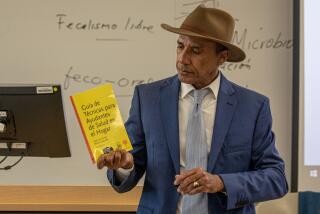2nd Phase of Amnesty Requirements Told : INS Says Temporary Residents Must Know English, Citizenship
- Share via
WASHINGTON — The federal government, unveiling the next phase of proposed requirements for illegal aliens seeking legal residency, said Wednesday that applicants must complete at least 30 hours of instruction in basic English and citizenship courses unless they can demonstrate competence in these areas.
The requirements, which set off a new round of controversy, apply to those aliens who completed the program’s first stage by filing for temporary residency status by the deadline two weeks ago.
After living here for 18 months on temporary status, the aliens have a year to apply for permanent residency. The proposed rules clarify how they can clear that hurdle.
‘Minimal Understanding’
Previously, the Immigration and Naturalization Service has said that to become permanent residents of this country, the aliens should demonstrate a “minimal understanding of ordinary English and a knowledge and understanding of the history and government of the United States.” If they did not have that knowledge, they should show they are “satisfactorily pursuing a course of study” to get it.
In the new guidelines, the agency specifies that satisfactory progress will be considered completion of at least 30 hours of instruction by the end of the one-year period. The full courses should be at least 60 hours, but half will qualify an alien to submit his application, it said.
In proposing its regulations, the INS took the unusual step of releasing them for comment before publishing them in the Federal Register. It will accept comments until June 20 and then issue a revised set of rules in late July.
Called Too Demanding
Immigrant rights advocates immediately attacked the proposal as too demanding, beginning what some are calling “Round 2” of the battle over amnesty rules. Most of the criticism centered on the shortage of classes around the nation and on what critics said is a lack of INS public education efforts to inform aliens about the amnesty program’s requirements.
Dale Frederick Swartz, president of the National Immigration, Refugee and Citizenship Forum, said that many private agencies helping aliens exhausted their funds in the first phase of the program. With these groups now unable to get out the word and the shortage of basic education classes, “the infrastructure to satisfy (the program’s requirements) is inadequate,” he said.
In Los Angeles, school officials have set up 432 special classes for amnesty preparation, said Wesley Balbuena, a consultant to the school district’s adult and occupational education program. He said the classes have eased the city’s problems, cutting the waiting list for English courses from 25,000 to 9,400.
“We’re doing the best we can” to cope with the demand, Balbuena said, asserting that the system needs more federal education aid to whittle the backlog further.
Funds Provided
To help states offset the cost of the program, the 1986 Immigration Reform and Control Act provides $928 million in fiscal 1988, with distribution based on how many illegal immigrants applied in each state.
Carol de los Reyes, a spokesman at the Health and Human Services Department, which administers the aid, said the funds “weren’t intended to pay all costs” incurred in the legalization effort.
INS officials said the agency has received 1,533,387 applications for legal status in the yearlong program that began in May, 1987. Those who are accepted cannot apply for permanent residency until they have been temporary residents for 18 months. Thus, the first applications for permanent residency will not be accepted until Nov. 7, 1988.
If aliens fail to apply for permanent residency within 2 1/2 years after their original application for temporary residency, they will be illegal and at risk of deportation.
Tests Criticized
The INS said in its proposed regulations that the ability to read and write English and the knowledge and understanding of U.S. government will be tested by excerpts from the Federal Textbooks on Citizenship. Advocates for immigrants have criticized such tests as unduly difficult, but INS officials deny this.
Those who fail the first test, the INS said, will be given a second test before their application is denied. Those who fail may also submit an affidavit stating that they have completed the required 30 hours of study.
The INS said it will monitor the courses and visit class sites. It also is issuing guidelines on textbooks and teacher qualifications, prompting Swartz to complain that the INS may be unqualified to make such educational judgments.
More to Read
Sign up for Essential California
The most important California stories and recommendations in your inbox every morning.
You may occasionally receive promotional content from the Los Angeles Times.













